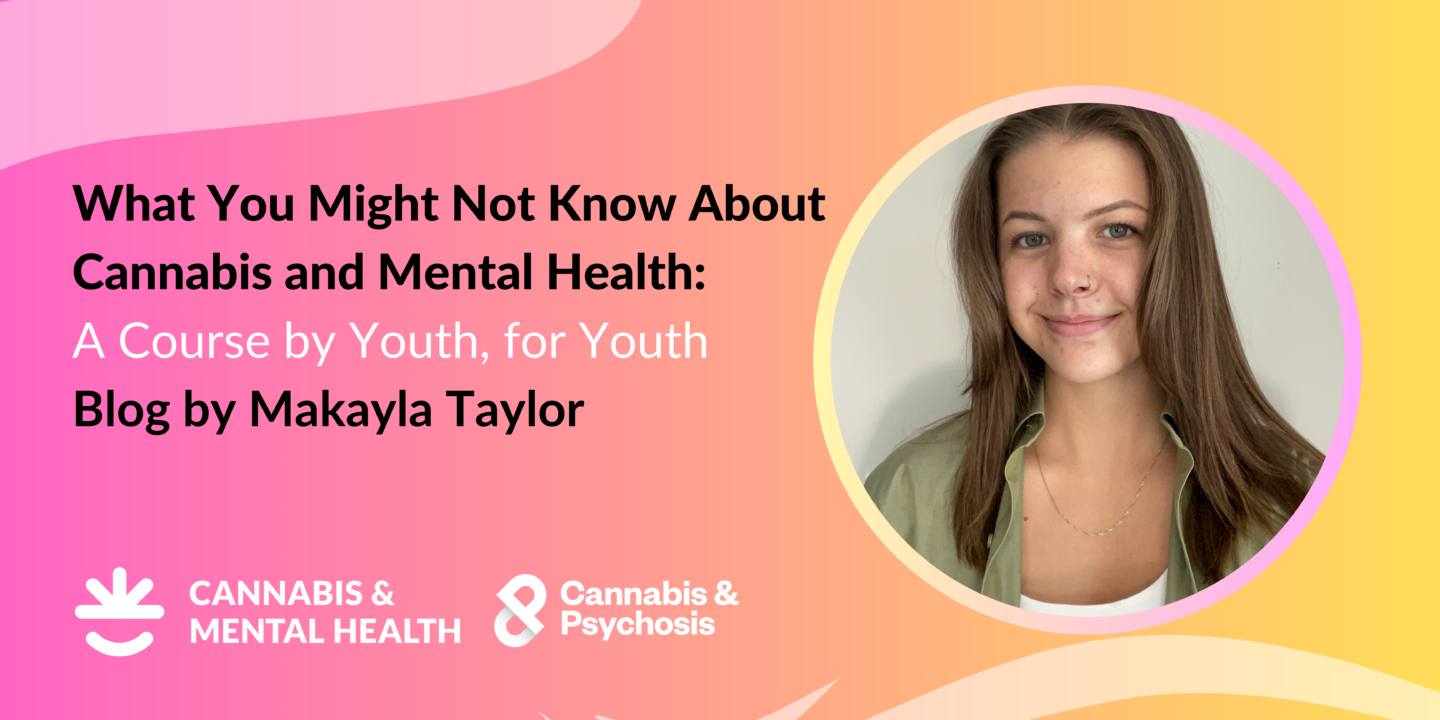What You Might Not Know About Cannabis and Mental Health: A Course by Youth, for Youth
What does “mental health” mean to you? How can cannabis affect your mental health? The newly launched course Cannabis and Mental Health answers these questions by providing evidence based information for youth across Canada.
How I Learned about the Course
I first learned about Cannabis and Mental Health through my co-worker Niki Pankratz, who is involved in the course as a Strategic Advisor. When she told me that the course would be promoted on Vancouver Island University’s campus that week, I was keen to learn more about it.
When I visited the booth, project facilitator Kiah Ellis-Durity, told me more about the course, which seeks to educate youth on the relationship between cannabis use and mental health. With the growing popularity of cannabis and increasing focus on mental health, I was intrigued by the topic and decided to take the course.
What I Liked and Learned
Divided into four modules, the course is laid out in a practical way. The modules are composed of a series of short visual-based videos, making the course easy to follow. Each module ends with a reminder to take a break, helping to ensure you take care of yourself while you learn.
Spotlighting the voices of youth across Canada, the course is well balanced. Instead of exclusively focusing on science or statistics, young people also share their personal experiences with mental health and cannabis. Because these topics may still be considered taboo for some people, discussing them openly on a public platform helps destigmatize these conversations while also prompting viewers to contemplate their own understandings of the topics. By listening to the various perspectives offered, I gained a better grasp of mental health and cannabis, and how they can interact.
You may be thinking that a course on cannabis and mental health could encourage youth to use the substance to cope with the ups and downs of their mental health. But the course took an objective approach, simply providing free education without promoting or prohibiting cannabis use. By doing so, those taking the course can receive unbiased educational content that allows them to make their own informed decisions on using cannabis and maintaining their mental health.
My favorite module focuses on legal and social issues of cannabis in Canada and considers how past legislation and social stigma has affected how cannabis is regarded today. For example, did you know that cannabis only became illegal in Canada in 1923 when it was added to the Opium and Narcotic Drug Act? Yet less than a century later, cannabis was officially legalized, marking a significant change in how the public’s perception has evolved.
To give you a better idea of the content in Cannabis and Mental Health, here are a few of my key takeaways:
- Mental health is not limited to one definition. Understanding what it means to you can help you learn how to support your own mental health.
- Like physical health, mental health has its ups and downs. It is important to take care of your mental health so that you can feel good and balanced in your day-to-day life.
- The legalization of cannabis has increased its accessibility and safety, and has led to debate around the upholding of criminal records of those previously convicted on simple possession charges.
- Racialized groups in Canada have historically been disproportionately represented in cannabis possession charges. The racialization of cannabis in Canada is unjust and changes are needed to eradicate these disparities.
How I Applied the Course Content to my University Class
When finals were approaching, I was feeling stressed and overwhelmed. I had to prepare a persuasive speech for my public speaking class, but found myself lost for ideas.
During this time, I noticed I was using cannabis more often. It helped ease my stress and calm my mind. While smoking one night, I started thinking about how easily accessible cannabis has become, and how beneficial it can be. Why is it, then, that cannabis use is still stigmatized?
After thinking some more about this question, I decided to write my speech about the legal and social aspects of cannabis in Canada. When I shared this idea with my coworker, she told me about the course available through Cannabis and Mental Health. I realized taking the course might help me with my assignment.
The argument I made was why people who were imprisoned for simple possession of cannabis should have been released upon its legalization, and why they should now have their criminal records expunged. The mental health aspect is integral to this topic, I was thankful to have learned about the course when I did. Plus, including my new certificate in my presentation upped my credibility and emphasized the relevance of mental health to cannabis.
So Why Does this Matter?
Educating myself about cannabis, mental health, and the link between the two in a free, online course was definitely something new for me. If you haven’t learned about this subject yet, I recommend giving it a go! Understanding why others use cannabis and how they maintain their mental health may provide insight into your own cannabis-using habits and mental health supports.
Whether you’re a young adult wanting to be there for your friend, a parent wanting to know how to support your teenager, or simply a university student like me struggling with an assignment, understanding the relationship between cannabis and mental health can help you help them.
Makayla Taylor
Makayla is a third year student studying English at Vancouver Island University. Passionate about social justice, she plans to pursue a career in law. She loves reading, vegan cooking, traveling, and her dog, Brutes.



